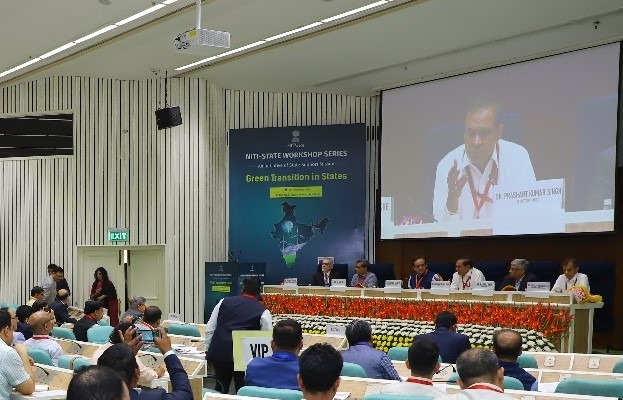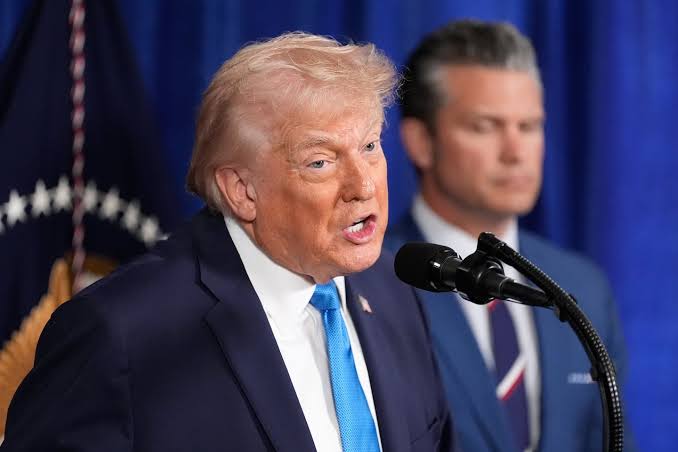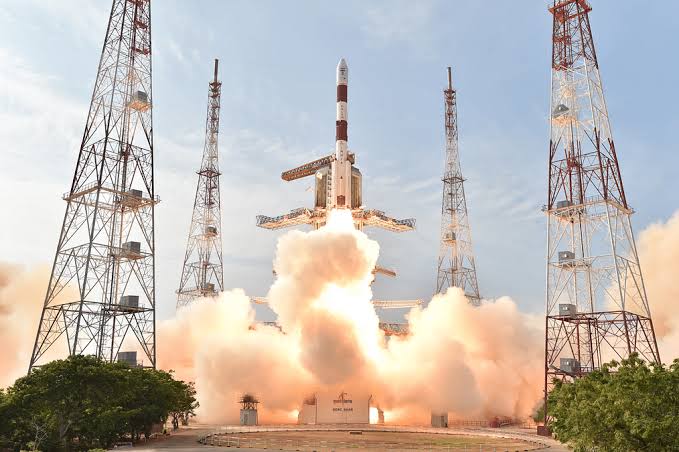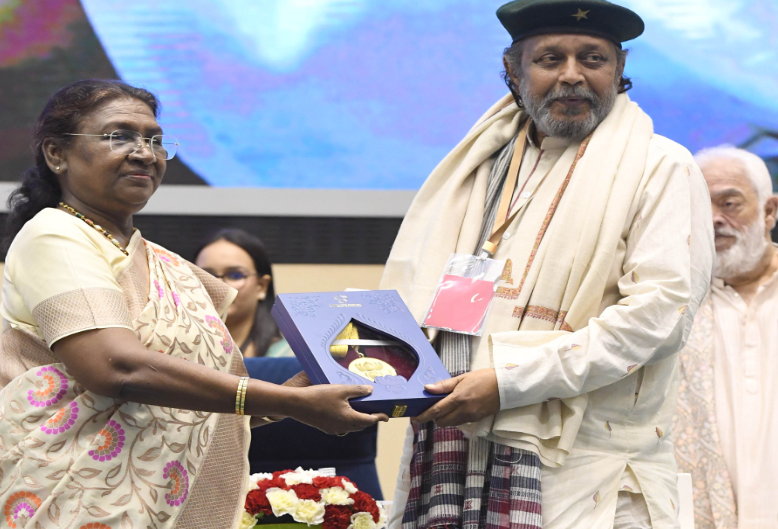On November 12, 2024, NITI Aayog organized a symposium titled “Green Transition in States” at Vigyan Bhawan, New Delhi. The event, aimed at advancing sustainable energy transition in Indian states, was held in collaboration with ISEG Foundation as the knowledge partner.
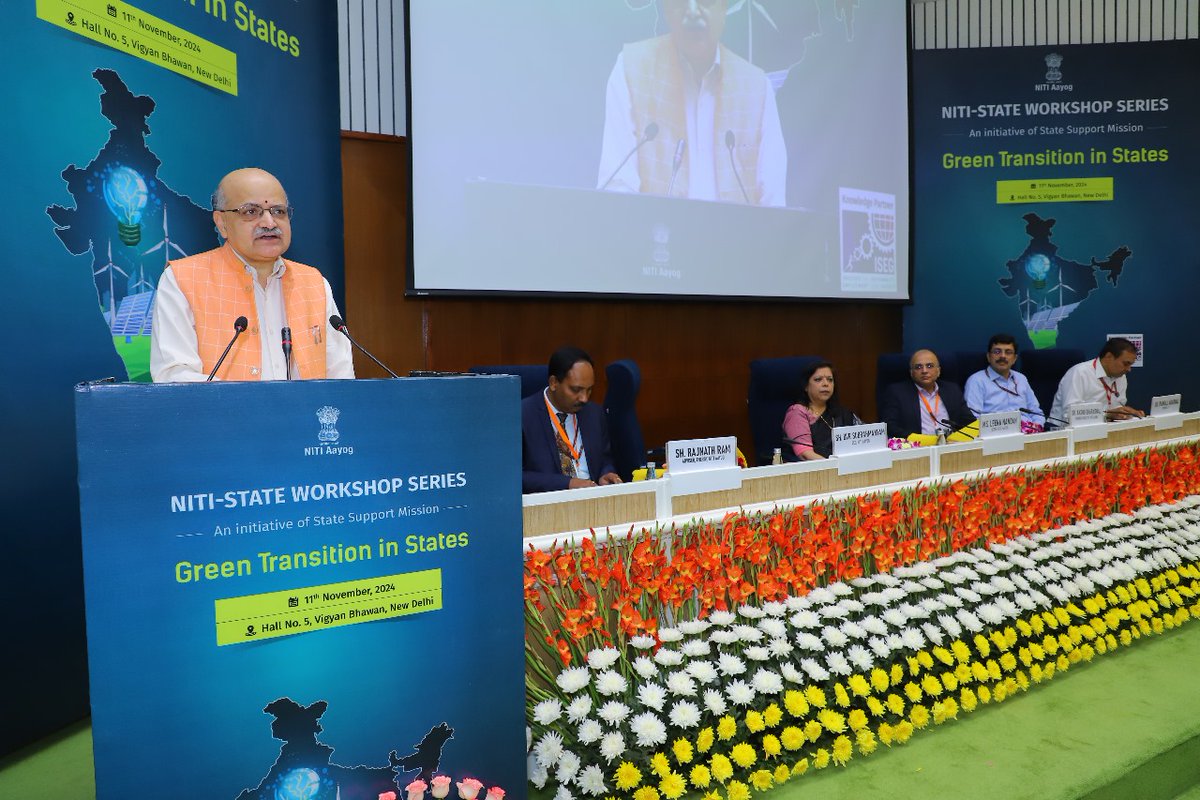 The symposium saw active participation from senior leaders across central and state governments, including Sh. Suman Bery (Vice Chairperson, NITI Aayog), Sh. B. V. R. Subrahmanyam (CEO, NITI Aayog), Sh. R P Gupta (Chairman and Managing Director, SECI), Ms. Leena Nandan (Secretary, Ministry of Environment, Forest and Climate Change), Sh. Pankaj Agarwal (Secretary, Ministry of Power), Sh. Pankaj Jain (Secretary, Ministry of Petroleum and Natural Gas), and Sh. Prashant Kumar Singh (Secretary, Ministry of New and Renewable Energy).
The symposium saw active participation from senior leaders across central and state governments, including Sh. Suman Bery (Vice Chairperson, NITI Aayog), Sh. B. V. R. Subrahmanyam (CEO, NITI Aayog), Sh. R P Gupta (Chairman and Managing Director, SECI), Ms. Leena Nandan (Secretary, Ministry of Environment, Forest and Climate Change), Sh. Pankaj Agarwal (Secretary, Ministry of Power), Sh. Pankaj Jain (Secretary, Ministry of Petroleum and Natural Gas), and Sh. Prashant Kumar Singh (Secretary, Ministry of New and Renewable Energy).
Launch of ASSET Platform
During the symposium, NITI Aayog, in partnership with the Ministry of Power and the Ministry of New and Renewable Energy, launched the ASSET platform—Accelerating Sustainable Solutions for Energy Transition. The platform is designed to support Indian states in accelerating their green transition efforts. ASSET aims to help states create and implement energy transition blueprints, develop a pipeline of investable projects, showcase best practices across states, and explore emerging technologies in critical areas such as Battery Energy Storage Systems (BESS), Green Hydrogen, Energy Efficiency, E-mobility, Offshore Wind, and more.
The role of states is central to achieving India’s national climate goals, including becoming a “Viksit Bharat” (Developed Nation) by 2047 and achieving net-zero greenhouse gas emissions by 2070. To meet these ambitious targets, states need to develop tailored energy transition plans that align with the nation’s broader objectives. This process involves three key steps:
- Preparing comprehensive energy transition blueprints at the state level.
- Developing bankable and investible projects for successful implementation.
- Fostering innovation in emerging green technologies.
Key Insights from Leaders
- Sh. Suman Bery, Vice Chairperson of NITI Aayog, addressed the financial challenges associated with the expansion of renewable energy, stressing the need for innovative funding models that enable private-sector-driven growth in the renewable energy space.
- Sh. B. V. R. Subrahmanyam, CEO of NITI Aayog, emphasized the importance of cooperative federalism and highlighted ASSET’s role in equipping states with the tools needed to develop comprehensive and viable green transition plans in line with national climate and energy goals.
- Sh. R P Gupta, CMD of SECI, discussed the need to move away from fossil fuels, focusing on the critical role of renewable energy and the challenges associated with seasonal intermittency. He also called for the commercialization of advanced long-term storage technologies to address these challenges.
- Ms. Leena Nandan, Secretary of the Ministry of Environment, Forest and Climate Change, highlighted initiatives like LiFE (Lifestyle for Environment), which promotes environmentally sustainable lifestyles, and the “Ek Ped Maa Ke Naam” program, which has resulted in planting 99 crore saplings across the country as part of India’s efforts to increase forest cover.
- Sh. Pankaj Jain, Secretary of the Ministry of Petroleum and Natural Gas, focused on the role of clean alternative fuels such as ethanol, methanol, biogas, Sustainable Aviation Fuel (SAF), and waste-based biofuels in reducing dependence on fossil fuels.
- Sh. Pankaj Agarwal, Secretary of the Ministry of Power, outlined ongoing efforts to strengthen India’s energy infrastructure to meet growing peak demand. He noted the increasing reliance on hydropower and renewable energy-based storage solutions.
- Sh. Prashant Kumar Singh, Secretary of the Ministry of New and Renewable Energy, shared updates on the Production-Linked Incentive (PLI) scheme, which has significantly boosted India’s solar PV manufacturing capacity. He also spoke about the success of the PM-KUSUM scheme in promoting rural solar energy deployment and the importance of distributed solar initiatives under the PM Surya Ghar program. These efforts contribute to India’s target of achieving 500 GW of renewable energy capacity.
Best Practices Sessions
The symposium included two sessions showcasing best practices, where various states, private sector firms, and think tanks shared their insights and experiences in advancing the green transition. These sessions provided valuable examples and strategies for accelerating the adoption of renewable energy technologies and sustainable practices at the state level.
In conclusion, the symposium was an important step in fostering collaboration among state and central governments, as well as private stakeholders, to ensure a smooth and effective transition to a green, sustainable energy future for India.

